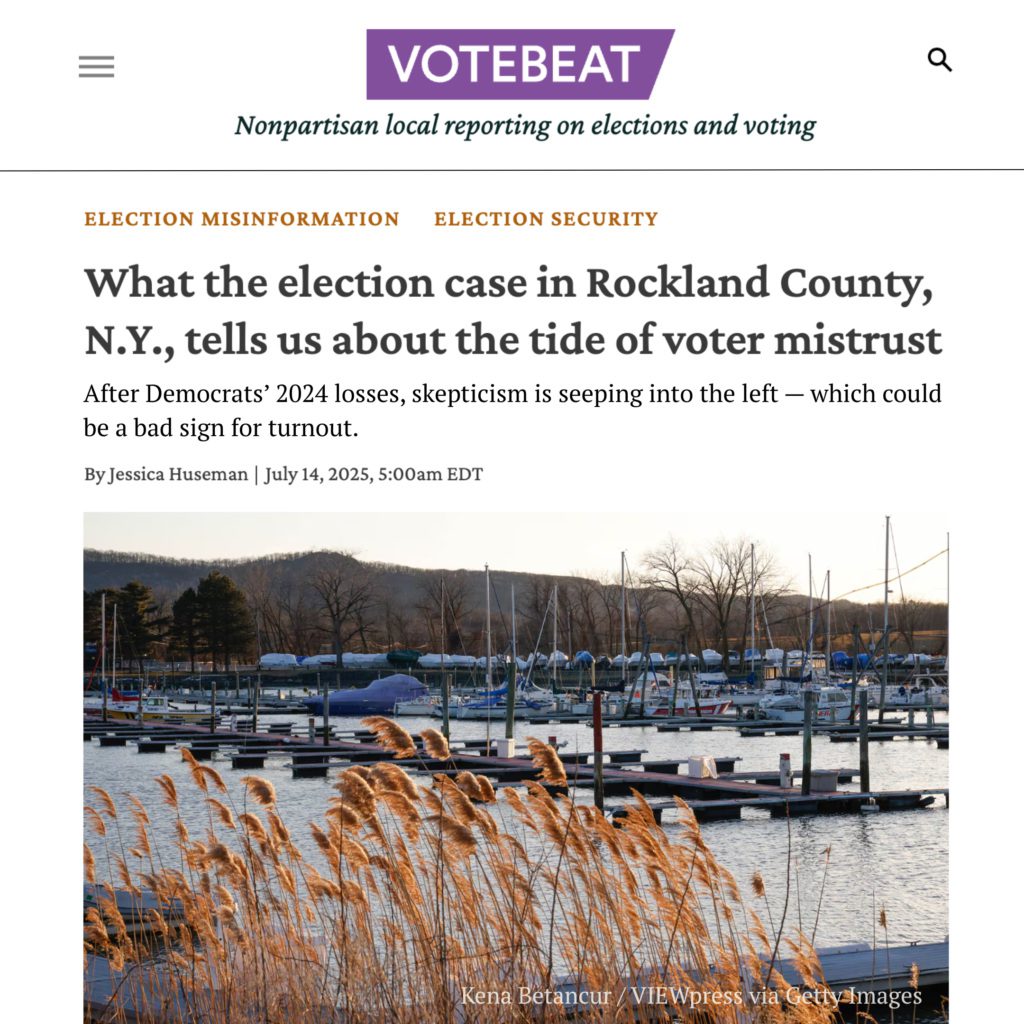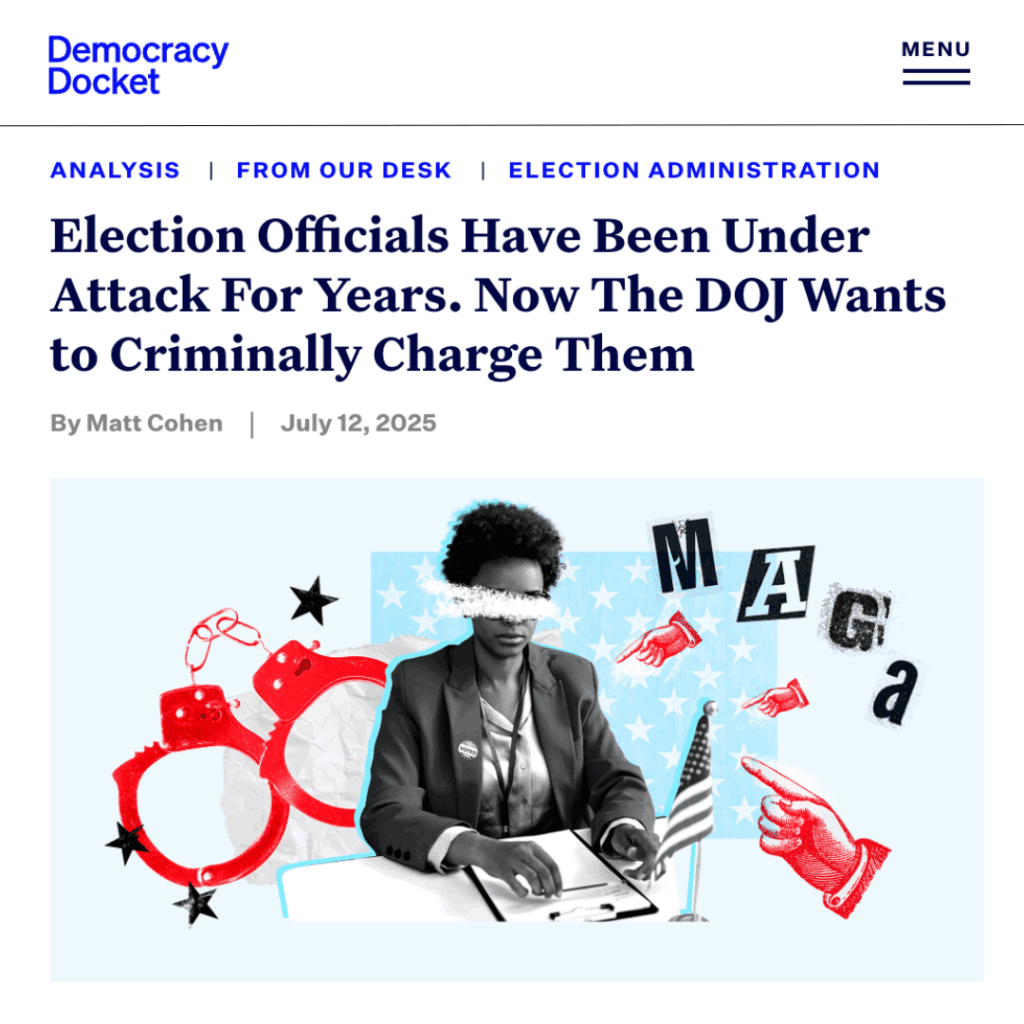Confidence is Contagious
Plus: States sue the Trump administration over education and disaster funding. 🗳️
This Week in Democracy
- States United published new research that shows that as many as 5.7 million people may not have voted in the 2024 general election because of lower confidence levels. The report, which compares pre-election survey responses with 2024 verified voting records, shows the stark cost of election denialism.
“We’ve known for years how dangerous election lies can be—and now we have the data to back that up,” said CEO Joanna Lydgate.
➡️ READ: When Americans Trust Elections, They Are More Likely to Vote
- The U.S. Supreme Court lifted a lower court’s order, allowing the Trump administration to continue its efforts to fire hundreds of employees at the Department of Education and dismantle the federal agency. In her dissent, Justice Sonia Sotomayor said only Congress has the authority to abolish the department and the courts should not allow the president to continue breaking the law. She added that “the threat to our Constitution’s separation of powers is grave.”
Litigation will continue in the lower courts.
➡️ READ: Sharing the Facts About State Authority and Education
- A coalition of 25 states sued the Trump administration for withholding $6.8 billion in education funding nationwide. Those cuts have threatened programs that improve school conditions, support students with special needs, and fund after-school programs. The coalition argued that since the funds were allocated by Congress, the administration is breaking the law by withholding them.
The administration’s actions are “contrary to law, arbitrary and capricious, and unconstitutional,” the lawsuit added.
➡️ READ: Sharing the Facts About Unlawful Attempts to Freeze Federal Funds
- Twenty states sued the Federal Emergency Management Agency (FEMA), arguing the Trump administration was illegally withholding grant funding meant to help protect communities from natural disasters. Even though Congress already approved the funding for its resilient infrastructure program, FEMA has canceled ongoing projects and refused to divvy up funding for other projects. The lawsuit argues the Trump administration is violating separation of powers, as outlined in the Constitution.
“In the wake of devastating flooding in Texas and other states, it’s clear just how critical federal resources are in helping states prepare for and respond to natural disasters,” Massachusetts Attorney General Andrea Joy Campbell said in a statement.
State of the States
In California, the Pentagon announced that half of the nearly 4,000 National Guard troops that the president deployed to Los Angeles six weeks ago were being released. State leaders widely criticized the unprecedented deployment after President Trump seized control of the National Guard over the governor’s objections. Those troops, who were originally deployed in response to demonstrations against federal immigration policy, have been used to accompany immigration raids.
There are still 2,000 National Guard members and 700 Marines deployed in the Los Angeles area. The deployment has left National Guard members feeling demoralized, according to recent reports. “The moral injuries of this operation, I think, will be enduring,” one Guard official told the New York Times. “This is not what the military of our country was designed to do, at all.”
️➡️ READ: Sharing the Facts About Domestic Military Deployment and State Authority
In Colorado, authorities arrested a man who allegedly threw a Molotov cocktail into the Archuleta County Clerk’s office. The arson suspect targeted a room that housed Dominion voting equipment—a target of conspiracy theories in the election denial movement. The attack displaced clerk office staff who serve the county of 13,000 residents.
“Election officials now are wondering, why do I still do this if my office is going to get firebombed by a Molotov cocktail?” Matt Crane, the head of the Colorado County Clerks Association, told Colorado Public Radio.
In Pennsylvania, Secretary of the Commonwealth Al Schmidt unveiled a redesigned provisional-ballot envelope aimed at reducing technical errors that lead to rejections. The new design attempts to make the signature process more intuitive for voters and poll workers. Previous redesigns have led to a drop in the number of rejected ballots in recent years.
The new provisional ballot design is voluntary, though the Department of State is offering financial assistance. “Improvements to envelope design might seem like a small thing, but it has a huge impact on the ability for Pennsylvanians across the commonwealth to have their votes counted,” said Philadelphia City Commissioner Seth Bluestein.
Recommended Reading
In Votebeat, Research Director Kelly Rader outlined the “concrete evidence” that shows that election lies negatively impact voter participation. Pulling from States United’s recently released research, Rader said there are consequences when politicians say elections are rigged after they lose: When voters get disillusioned by the democratic process, they stay home.
Dax Goldstein, the Election Protection Program director at States United, spoke with Democracy Docket about the U.S. Department of Justice’s recent probes of at least nine state election offices to gather voter registration data and inspect ballots and voting equipment. Lies and conspiracy theories about the election process are fueling the department’s actions, which could continue to hurt voters’ trust and the wellbeing of election officials.
“We can expect it to supercharge the kind of abuse that they’ve already been dealing with for years now,” Goldstein said. “With profound effects on their health and safety.”

